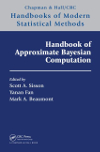- About MAA
- Membership
- MAA Publications
- Periodicals
- Blogs
- MAA Book Series
- MAA Press (an imprint of the AMS)
- MAA Notes
- MAA Reviews
- Mathematical Communication
- Information for Libraries
- Author Resources
- Advertise with MAA
- Meetings
- Competitions
- Programs
- Communities
- MAA Sections
- SIGMAA
- MAA Connect
- Students
- MAA Awards
- Awards Booklets
- Writing Awards
- Teaching Awards
- Service Awards
- Research Awards
- Lecture Awards
- Putnam Competition Individual and Team Winners
- D. E. Shaw Group AMC 8 Awards & Certificates
- Maryam Mirzakhani AMC 10 A Awards & Certificates
- Two Sigma AMC 10 B Awards & Certificates
- Jane Street AMC 12 A Awards & Certificates
- Akamai AMC 12 B Awards & Certificates
- High School Teachers
- News
You are here
Handbook of Approximate Bayesian Computation

Publisher:
CRC Press
Publication Date:
2018
Number of Pages:
678
Format:
Hardcover
Price:
184.95
ISBN:
9781439881507
Category:
Handbook
[Reviewed by , on ]
Thomas J. Faulkenberry
12/22/2019
The Handbook of Approximate Bayesian Computation, edited by Sisson, Fan, and Beaumont, is a valuable resource for graduate students and researchers who work in applied Bayesian statistics. Approximate Bayesian methods form a large class of Bayesian techniques that are centered on problems that involve data-generating processes with likelihood functions that are at least partially intractable. Examples of these include problems involving massive data sets and situations where likelihood functions can only be defined implicitly. In the absence of the likelihood function, evaluation of the associated posterior distribution may initially appear impossible. As is clear by the size of this volume, this statement could not be further from the truth. Indeed, the chapters of Handbook of Approximate Bayesian Computation have opened my eyes to a new world of possibilities with Bayesian computation in some research problems of my own.
The book is an edited volume, but don’t let that guide your predictions about its worth. In my reading, I found that its tone and structure are more akin to that of a comprehensive textbook and reference book than your typical, esoteric collection of conference papers that form the basis of many edited volumes. Immediately upon opening the book, the reader will be delighted with the first chapter, which provides an incredibly lucid overview of approximate Bayesian computation. This chapter forms a critical foundation for the remainder of the book, whose chapters present considerably more detail on most of the topics mentioned in this initial overview chapter.
Please note that a comfortable read of this book will require the reader to be well-versed in the basics of Bayesian statistics. In only the first page of Chapter 1, the reader is reminded of Bayes theorem and how to approximate posterior distributions with such techniques as importance sampling, Markov chain Monte Carlo methods, the Metropolis-Hastings algorithm, and more. Clearly, this is not a book for beginners!
But, the structure of the book is arranged such that it could serve nicely as the basis of an advanced graduate course on approximate Bayesian computation. Roughly, the first 60% of the book is formed by chapters that present the various methods used in approximate Bayesian computation, whereas the remaining 40% is devoted to some specific applications of these techniques, with topics including drug resistance, genetics, climate, ecology, and nuclear imaging. If one were to try to use this as a textbook, there is plenty of room for individual topic selection.
However, I do not feel that the role of “textbook” is where this volume best serves. Rather, I find that this is a book that manages to fill a valuable niche for researchers and graduate students who need to apply approximate Bayesian methods in their own work. This book is what I always wanted as a graduate student: an artfully arranged (and nicely bound) collection of tutorial papers on the basics of approximate Bayesian computation. Each paper is different in its tone, but most include very helpful pseudocode (and even some R scripts) to help researchers immediately get to work using (and understanding) these methods. I applaud the editors of this book and the chapter authors on managing to arrange this excellent volume. The book should be immediately useful to researchers in a wide variety of applied fields.
Thomas J. (Tom) Faulkenberry, Ph.D., is an Associate Professor in the Department of Psychological Sciences at Tarleton State University. He teaches courses on statistical methods and mathematical modeling in the behavioral sciences, and his primary research areas are mathematical cognition and Bayesian statistics.
See the publisher's web page.
- Log in to post comments




